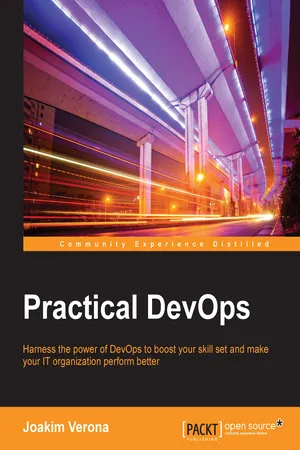
- 240 pages
- English
- ePUB (mobile friendly)
- Available on iOS & Android
Practical DevOps
About this book
Harness the power of DevOps to boost your skill set and make your IT organization perform better
About This Book
- Get to know the background of DevOps so you understand the collaboration between different aspects of an IT organization and a software developer
- Improve your organization's performance to ensure smooth production of software and services
- Deploy top-quality software and ensure software maintenance and release management with this practical guide
Who This Book Is For
This book is aimed at developers and system administrators who wish to take on larger responsibilities and understand how the infrastructure that builds today's enterprises works. This book is also great for operations personnel who would like to better support developers. You do not need to have any previous knowledge of DevOps.
What You Will Learn
- Appreciate the merits of DevOps and continuous delivery and see how DevOps supports the agile process
- Understand how all the systems fit together to form a larger whole
- Set up and familiarize yourself with all the tools you need to be efficient with DevOps
- Design an application that is suitable for continuous deployment systems with Devops in mind
- Store and manage your code effectively using different options such as Git, Gerrit, and Gitlab
- Configure a job to build a sample CRUD application
- Test the code using automated regression testing with Jenkins Selenium
- Deploy your code using tools such as Puppet, Ansible, Palletops, Chef, and Vagrant
- Monitor the health of your code with Nagios, Munin, and Graphite
- Explore the workings of Trac—a tool used for issue tracking
In Detail
DevOps is a practical field that focuses on delivering business value as efficiently as possible. DevOps encompasses all the flows from code through testing environments to production environments. It stresses the cooperation between different roles, and how they can work together more closely, as the roots of the word imply—Development and Operations.
After a quick refresher to DevOps and continuous delivery, we quickly move on to looking at how DevOps affects architecture. You'll create a sample enterprise Java application that you'll continue to work with through the remaining chapters. Following this, we explore various code storage and build server options. You will then learn how to perform code testing with a few tools and deploy your test successfully. Next, you will learn how to monitor code for any anomalies and make sure it's running properly. Finally, you will discover how to handle logs and keep track of the issues that affect processes
Style and approach
This book is primarily a technical guide to DevOps with practical examples suitable for people who like to learn by implementing concrete working code. It starts out with background information and gradually delves deeper into technical subjects.
Tools to learn more effectively

Saving Books

Keyword Search

Annotating Text

Listen to it instead
Information
Practical DevOps
Table of Contents
Practical DevOps
Credits
About the Author
About the Reviewers
Table of contents
- Practical DevOps
Frequently asked questions
- Essential is ideal for learners and professionals who enjoy exploring a wide range of subjects. Access the Essential Library with 800,000+ trusted titles and best-sellers across business, personal growth, and the humanities. Includes unlimited reading time and Standard Read Aloud voice.
- Complete: Perfect for advanced learners and researchers needing full, unrestricted access. Unlock 1.4M+ books across hundreds of subjects, including academic and specialized titles. The Complete Plan also includes advanced features like Premium Read Aloud and Research Assistant.
Please note we cannot support devices running on iOS 13 and Android 7 or earlier. Learn more about using the app